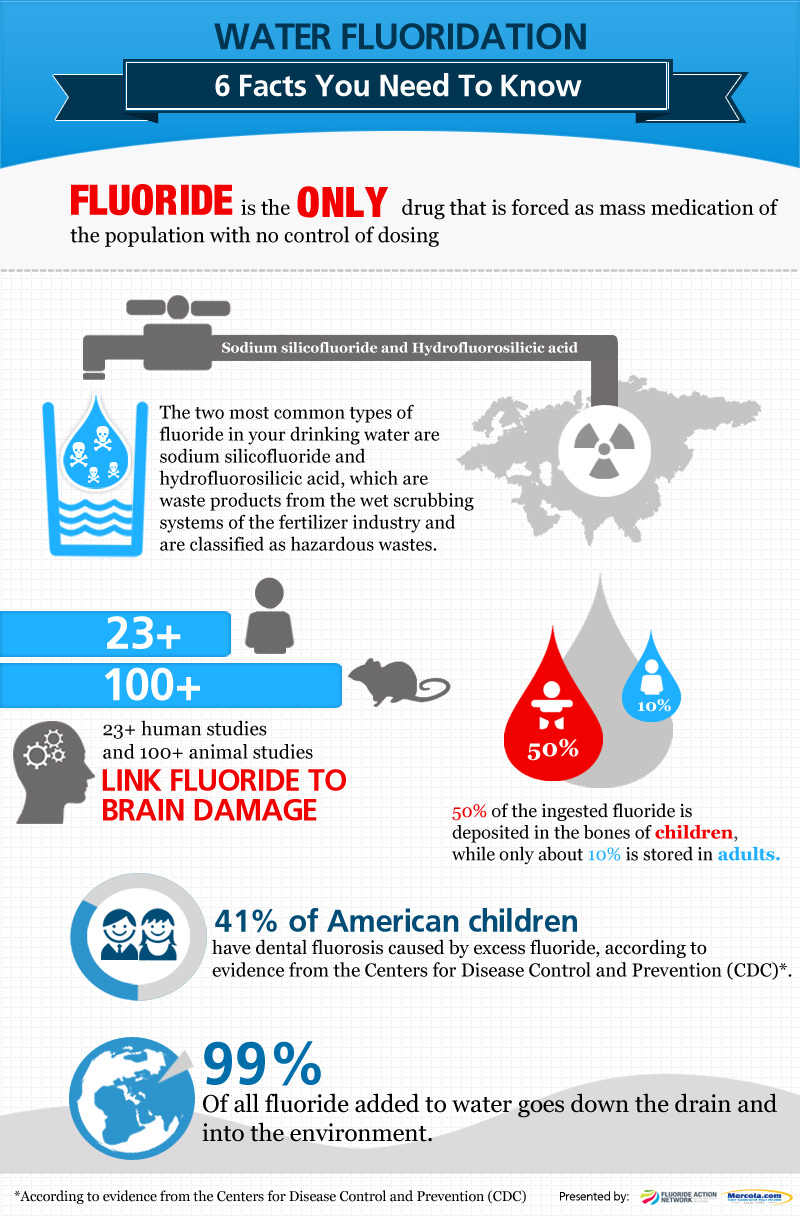Dr. Joseph Mercola
Huffington Post
Jan 28, 2013
A recent report from the U.S. National Research Council (NRC 2006) concluded that adverse effects of high fluoride concentrations in drinking water may be of concern and that additional research is warranted. Fluoride may cause neurotoxicity in laboratory animals, including effects on learning and memory ...
To summarize the available literature, we performed a systematic review and meta-analysis of published studies on increased fluoride exposure in drinking water and neurodevelopmental delays. We specifically targeted studies carried out in rural China that have not been widely disseminated, thus complementing the studies that have been included in previous reviews and risk assessment reports ...
Findings from our meta-analyses of 27 studies published over 22 years suggest an inverse association between high fluoride exposure and children's intelligence ... The results suggest that fluoride may be a developmental neurotoxicant that affects brain development at exposures much below those that can cause toxicity in adults ...
Serum-fluoride concentrations associated with high intakes from drinking-water may exceed 1 mg/L, or 50 Smol/L, thus more than 1000-times the levels of some other neurotoxicants that cause neurodevelopmental damage. Supporting the plausibility of our findings, rats exposed to 1 ppm (50 Smol/L) of water-fluoride for one year showed morphological alterations in the brain and increased levels of aluminum in brain tissue compared with controls ...
In conclusion, our results support the possibility of adverse effects of fluoride exposures on children's neurodevelopment. Future research should formally evaluate dose-response relations based on individual-level measures of exposure over time, including more precise prenatal exposure assessment and more extensive standardized measures of neurobehavioral performance, in addition to improving assessment and control of potential confounders.
Studies Have Repeatedly Linked Fluoride to Reduced IQ and Brain Damage
• Damage to your hippocampus
• Formation of beta-amyloid plaques (the classic brain abnormality in Alzheimer's disease)
• Reduction in lipid content
• Damage to purkinje cells
• Exacerbation of lesions induced by iodine deficiency
• Impaired antioxidant defense systems
• Increased uptake of aluminum
• Accumulation of fluoride in your pineal gland
Drinking water containing as little as 1.2 ppm fluoride will cause developmental disturbances. We cannot run the risk of producing such serious systemic disturbances. The potentialities for harm outweigh those for good.
Part of the problem is that it's an accumulative toxin that, over time, can lead to significant health problems that are not immediately linked to fluoride over-exposure. In a 2005 paper entitled "Fluoride -- A Modern Toxic Waste," Lita Lee, Ph.D. writes:
Yiamouyiannis' book, Fluoride, The Aging Factor, documents the cumulative effect of tissue damage by fluoride, commonly seen as aging (collagen damage), skin rashes and acne, gastrointestinal disorders, and many other conditions, including osteoporosis. The U.S. Center for Disease Control and the Safe Water Foundation reported that 30,000 to 50,000 excess deaths occur in the United States each year in areas in which the water contains only one ppm fluoride ...
Fluoride suppresses the immune system: Fluoride inhibits the movement of white blood cells by 70 percent, thereby decreasing their ability to reach their target. Yiamouyiannis cites 15 references in his pamphlet, Lifesavers Guide to Fluoridation, that document immunosuppressive effects of as little as 10 percent of the amount of fluoride used in fluoridated water ... Immunosuppressive effects run the gamut, from a cold that won't go away to increased risk of cancer and other infectious diseases.
• Disrupts synthesis of collagen
• Hyperactivity and/or lethargy
• Muscle disorders
• Thyroid disease
• Arthritis
• Dementia
• Bone fractures
• Lowered thyroid function
• Bone cancer (osteosarcoma)
• Inactivates 62 enzymes and inhibits more than 100
• Inhibited formation of antibodies
• Genetic damage and cell death
• Increased tumor and cancer rate
• Disrupted immune system
• Damaged sperm and increased infertility


